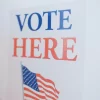A federal judge on Monday lifted a statewide ban on curbside voting and waived certain absentee ballot requirements for voters in at least Jefferson, Mobile, and Lee Counties.
U.S. District Judge Abdul Kallon, in his opinion Monday, approved, in part, a preliminary injunction filed by the NAACP Legal Defense & Educational Fund, Inc. (LDF), the Southern Poverty Law Center (SPLC) and the Alabama Disabilities Advocacy Program (ADAP).
Those groups sued Gov. Kay Ivey and Secretary of State John Merrill and seek to implement curbside voting for at-risk citizens during the COVID-19 pandemic. Plaintiffs also asked the court to remove requirements for certain voter IDs and that witnesses sign absentee ballot requests.
“No one should have to risk their health to vote. We’re happy that the Court removed Alabama’s needless barriers to voting and that many tens of thousands of vulnerable people will now have a safe means of voting in July,” said Deuel Ross, senior counsel at LDF in a statement.
The SPLC, in a press release Monday, said the judge waived for voters in at least Jefferson, Mobile, and Lee Counties the requirement that they must have their absentee ballot notarized or witnessed by two adults and the requirement that absentee voters who are 65 and older or disabled mail-in copies of their photo IDs.
“By Secretary Merrill’s own admission, voters who lack the means to photocopy their IDs at home will be forced to leave their homes to secure a copy from an outside printing vendor,” Kallon wrote in his opinion.
It is unclear whether, going forward, the judge’s waiving of witness or notary requirements could be expanded statewide. In the ruling, the district judge wrote that his injunction can only be directed toward the three counties with defendant absentee election managers.
To go into effect statewide, an injunction against Merrill would be needed. The judge cited past precedent in Jacobson v. Florida Secretary of State — a case in the 11th Circuit, which includes Alabama — saying that he does not believe the court rely on “an injunction directed to Secretary Merrill to establish standing.”
The judge wrote that an order would be needed against all 67 counties’ election officials, and only officials in Jefferson, Mobile and Lee counties were listed as defendants in this lawsuit.
Kallon continued that while waiving the witness and photo ID requirements may result in some burden to the defendants “who will have to quickly communicate the changed rules to local election officials and voters, those burdens do not outweigh the irreparable injury the individual plaintiffs and similarly-situated voters could incur by foregoing their right to vote.”
Alabama reported 5,302 new COVID-19 cases over the last seven days, which was the highest number of reported new cases over seven days since the outbreak began. At least 7,646 cases have been confirmed in the last two weeks — also the most in a two-week period.
On Sunday the state saw more than 1,000 new confirmed cases, making it the fourth straight day for record high new daily cases in Alabama. There have been 769 deaths due to the virus statewide.
“On the thirtieth anniversary of the passage of the Americans with Disabilities Act, the decision of this Court reaffirms the mandate of the law — people with disabilities shall have equal access to all programs and services,” said Bill Van Der Pol, senior trial counsel at ADAP. “People with disabilities should not be required to choose between two fundamental rights: access to the ballot box and their health and safety.”
Alabama’s next major election is set for July 14. The deadline to request an absentee ballot for that election is June 29.
“This ruling is not only a victory for our clients, whose pre-existing conditions make them especially vulnerable to COVID-19, but it is also a victory for at-risk Alabamians who should not have to jump over unnecessary hurdles to vote, especially in the middle of a global pandemic,” said Caren Short, senior staff attorney for the SPLC in a statement.



















































